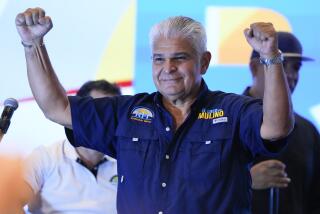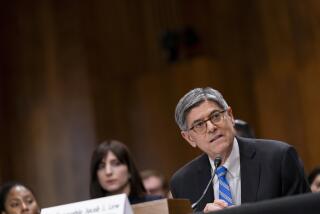OAS Council Approves Noreiga Ambassador Despite U.S. Protest
WASHINGTON — The permanent council of the Organization of American States on Saturday night seated the envoy of the government of Panamanian strongman Manuel A. Noriega over the objection of U.S. Ambassador Richard T. McCormack.
After council President Juan Antonio Llanes of Paraguay ruled that Roberto Leyton should occupy Panama’s seat in the 31-member council, McCormack said that “Ambassador Leyton’s reappointment as permanent representative of Panama was defective in that the person purportedly making the (re) appointment was not and is not the president of Panama.”
Spectators supporting deposed Panamanian President Eric A. Delvalle clapped loudly at McCormack’s statement. He also drew applause when he inserted into the record a communique from foreign ministers of seven Latin nations meeting in Colombia on Friday, who suspended Panama from what had been a group of eight states backing the Latin peace efforts of the Contadora group.
The OAS meeting had been delayed by a dispute over whether Panama would be represented at the session by Leyton, who had held the post, or Lawrence Chewning Fabriga, who said that he had been designated ambassador by Delvalle, the deposed president. Both men had argued heatedly, each demanding Panama’s seat.
Finally, after a closed debate, the permanent council decided to leave the choice to Llanes. He announced his decision for Leyton at the start of the formal session, called to discuss the Panamanian crisis.
During the meeting, there was further applause from the public gallery when Salvadoran Ambassador Ernesto Rivas-Gallont introduced former Panamanian envoy to Washington Gabriel Lewis as an accredited member of El Salvador’s delegation. Lewis attacked Noriega as the representative of what he called a new threat to Latin America--”narco-militarism.”
“Panama has become the laundry for the illicit drug traffic of the Americas,” Lewis declared.
Representatives of Costa Rica, Uruguay, Guatemala and Argentina voiced support for Delvalle but also expressed reservations about outside intervention in Panama’s internal affairs.
The public session had been scheduled to start at 4 p.m., but after an hour and a half in which Sen. Edward M. Kennedy (D-Mass.) and other observers waited patiently, Llanes convened the private meeting in the ornate OAS headquarters building.
Kennedy told reporters that it was a “moment of truth” for the inter-American organization. He praised the Reagan Administration’s backing of Delvalle.
Leyton, waiting outside the room where the issue of representation was being debated, told The Times: “There’s not a single article in the charter of the OAS that allows them to convoke this meeting. This is a political move by the international Christian Democrats. How can you judge a country when that country is not even represented?”
Leyton attacked El Salvador, the nation that requested the meeting on the Panamanian situation, saying the “internal situation there is much worse than in Panama.”
The Panamanian rejected being characterized as a “Noriega man.”
“I am not representing a person here,” he said. “I am representing my country and the good will of Panamanians who have taken no violent action.”
More to Read
Sign up for Essential California
The most important California stories and recommendations in your inbox every morning.
You may occasionally receive promotional content from the Los Angeles Times.










